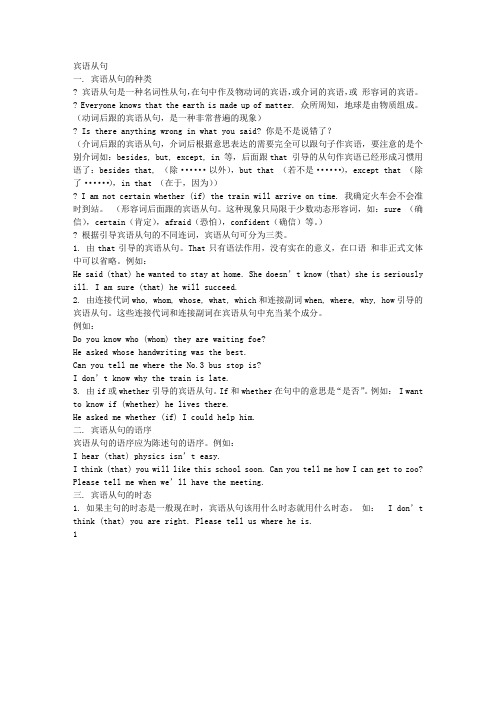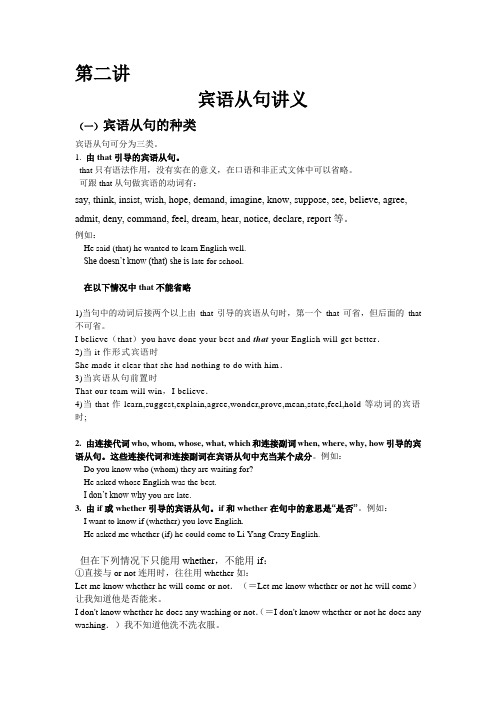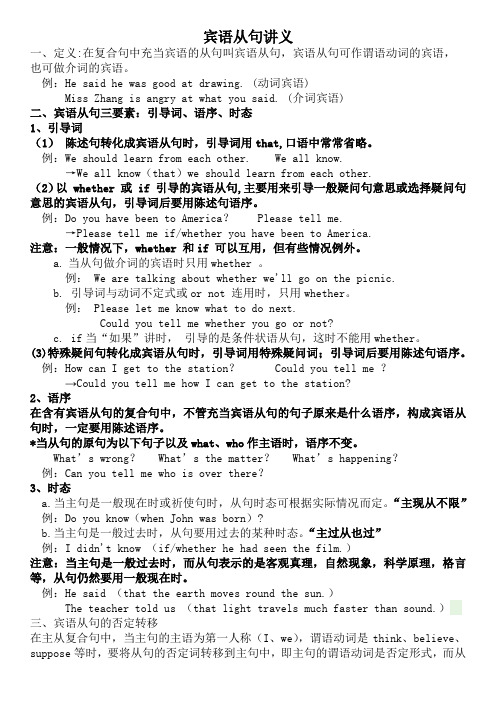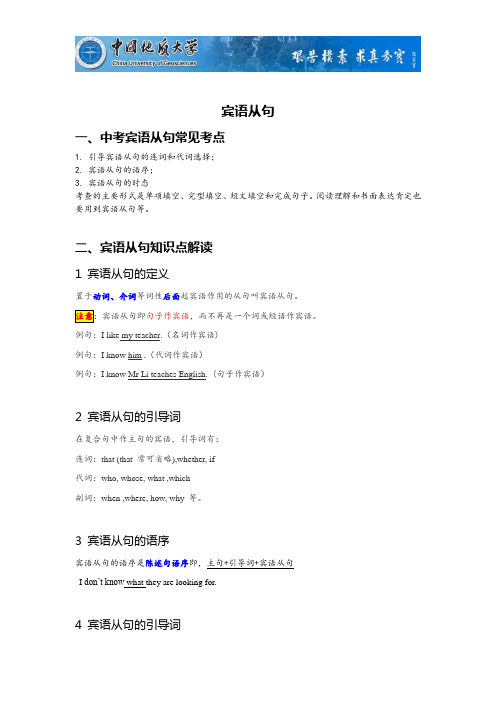宾语从句讲义
- 格式:doc
- 大小:36.00 KB
- 文档页数:3

宾语从句一. 宾语从句的种类? 宾语从句是一种名词性从句,在句中作及物动词的宾语,或介词的宾语,或形容词的宾语。
? Everyone knows that the earth is made up of matter. 众所周知,地球是由物质组成。
(动词后跟的宾语从句,是一种非常普遍的现象)? Is there anything wrong in what you said? 你是不是说错了?(介词后跟的宾语从句,介词后根据意思表达的需要完全可以跟句子作宾语,要注意的是个别介词如:besides, but, except, in 等,后面跟that 引导的从句作宾语已经形成习惯用语了:besides that, (除······以外),but that (若不是······),except that (除了······),in that (在于,因为))? I am not certain whether (if) the train will arrive on time. 我确定火车会不会准时到站。
(形容词后面跟的宾语从句。
这种现象只局限于少数动态形容词,如:sure (确信),certain(肯定),afraid(恐怕),confident(确信)等。
)? 根据引导宾语从句的不同连词,宾语从句可分为三类。
1. 由that引导的宾语从句。
That只有语法作用,没有实在的意义,在口语和非正式文体中可以省略。
例如:He said (that) he wanted to stay at home. She doesn’t know (that) she is seriously ill. I am sure (that) he will succeed.2. 由连接代词who, whom, whose, what, which和连接副词when, where, why, how引导的宾语从句。

第二讲宾语从句讲义(一)宾语从句的种类宾语从句可分为三类。
1. 由that引导的宾语从句。
that只有语法作用,没有实在的意义,在口语和非正式文体中可以省略。
可跟that从句做宾语的动词有:say, think, insist, wish, hope, demand, imagine, know, suppose, see, believe, agree, admit, deny, command, feel, dream, hear, notice, declare, report等。
例如:He said (that) he wanted to learn English well.She doesn’t know (that) she is late for school.在以下情况中that不能省略1)当句中的动词后接两个以上由that引导的宾语从句时,第一个that可省,但后面的that 不可省。
I believe(that)you have done your best and that your English will get better.2)当it作形式宾语时She made it clear that she had nothing to do with him.3)当宾语从句前置时That our team will win,I believe.4)当that作learn,suggest,explain,agree,wonder,prove,mean,state,feel,hold等动词的宾语时;2. 由连接代词who, whom, whose, what, which和连接副词when, where, why, how引导的宾语从句。
这些连接代词和连接副词在宾语从句中充当某个成分。
例如:Do you know who (whom) they are waiting for?He asked whose English was the best.I don’t know why you are late.3. 由if或whether引导的宾语从句。

宾语从句一、定义宾语,或的宾语。
【译】你能告诉我你们在讨论什么吗?【译】我确定他会成功。
二、分类一)由that引导的宾语从句(that没有实在的意义,可以省略。
)Eg. Lily told me (that) she never plays computer game.【译】她说她想待在家。
Eg. Can you tell me where the No.3 bus stop is?【译】我们不知道火车为什么晚点了。
【译】你们知道李明放学后在等谁吗?三)由if或whether引导的宾语从句。
【译】他问我是否能帮他一个忙。
【译】莉莉想知道她小学同学玛丽是否还住在成都。
三、语序【译】你能告诉我我们什么时候开始开会吗?【译】汤姆想知道如何去图书馆。
四、时态一)如果主句的时态是一般过去时,宾语从句只能用Eg.He asked what time it was.【译】他说他很快就会回到他的故乡了。
二)如果主句是与现在相关的时态(一般现在时、现在进行时、现在完成时等),Eg.I think (that) you are right.【译】我记得他昨天给了我一本书。
【译】老师告诉我们太阳从东方升起。
【译】科学家证明了地球是圆的。
五、直接引语和间接引语的相互转化。
1.The doctor says, “You had better stay at home for a week.”2.Teacher says, “You have to study hard.”3.Emma says, “I feel cold.”4.Tom says that he wants to be a basketball player in the future.5.They say that it’s not very hot in their city in summer.总结:课后练习一、单项选择题A. thatB. whichC. whyD. what2.Our teacher told us that we_______ the shoe factory the next week.A. visitedB. will visit C would visit D. visitA. mightB. mayC. has toD. canA.tells; would writeB. told; had writtenC. told; will writeD. tells; had written5.He asked __________ Betty came home late last night.A.thatB.whetherC.where6.Mr. White asked me whether I the book before.A. has readB. readC. had readD. would read7.Mr. Green says ____________they will go back to England.A whereB whichC whoD that8. A:What did Tony tell you?B: He told me he .A. leavesB. has leftC. was leavingD. will leave9.---Do you know____________?---At 9:00 tomorrow morning?A.when the video meeting beginB.when did the video meeting beginC.when the video meeting will beginD. when does the video meeting begin10.---Could you please tell me____________?---Throwing off poverty(脱贫)A.who people often talk about this yearB.what people often talk about this yearC.which do people often talk about this yearD.that people often talk about this year二、将下列直接引语变为间接引语,每空一词。

宾语从句讲义一、定义:在复合句中充当宾语的从句叫宾语从句,宾语从句可作谓语动词的宾语,也可做介词的宾语。
例:He said he was good at drawing. (动词宾语)Miss Zhang is angry at what you said. (介词宾语)二、宾语从句三要素:引导词、语序、时态1、引导词(1)陈述句转化成宾语从句时,引导词用that,口语中常常省略。
例:We should learn from each other. We all know.→We all know(that)we should learn from each other.(2)以 whether 或 if 引导的宾语从句,主要用来引导一般疑问句意思或选择疑问句意思的宾语从句,引导词后要用陈述句语序。
例:Do you have been to America? Please tell me.→Please tell me if/whether you have been to America.注意:一般情况下,whether 和if 可以互用,但有些情况例外。
a.当从句做介词的宾语时只用whether 。
例: We are talking about whether we'll go on the picnic.b. 引导词与动词不定式或or not 连用时,只用whether。
例: Please let me know what to do next.Could you tell me whether you go or not?c. if当“如果”讲时,引导的是条件状语从句,这时不能用whether。
(3)特殊疑问句转化成宾语从句时,引导词用特殊疑问词;引导词后要用陈述句语序。
例:How can I get to the station? Could you tell me ?→Could you tell me how I can get to the station?2、语序在含有宾语从句的复合句中,不管充当宾语从句的句子原来是什么语序,构成宾语从句时,一定要用陈述语序。

宾语从句一、中考宾语从句常见考点1. 引导宾语从句的连词和代词选择;2. 宾语从句的语序;3. 宾语从句的时态考查的主要形式是单项填空、完型填空、短文填空和完成句子。
阅读理解和书面表达肯定也要用到宾语从句等。
二、宾语从句知识点解读1 宾语从句的定义置于动词、介词等词性后面起宾语作用的从句叫宾语从句。
注意:宾语从句即句子作宾语,而不再是一个词或短语作宾语。
例句:I like my teacher.(名词作宾语)例句:I know him .(代词作宾语)例句:I know Mr Li teaches English. (句子作宾语)2 宾语从句的引导词在复合句中作主句的宾语,引导词有:连词:that (that 常可省略),whether, if代词:who, whose, what ,which副词:when ,where, how, why等。
3 宾语从句的语序宾语从句的语序是陈述句语序即,主句+引导词+宾语从句I don’t know what they are looking for.4 宾语从句的引导词4.1 that引导的宾语从句可跟that从句做宾语的动词有:say, think, insist, wish, hope, demand, imagine, wonder, know, suppose, see, believe, agree, admit, deny, expect, explain, order, command, feel, dream, suggest, hear, mean, notice, prefer, request, require, propose, declare, report等。
例句:The boy believes that he will travel through space to other planets.注意:当主句谓语动词是think, believe, suppose, expect 等词,而宾语从句的意思是否定时,常把否定转移至主句表示。

宾语从句一、定义及种类定义:宾语从句在复合句中作主句的宾语宾语从句可以作及物动词、介词或形容词的宾语。
及物动词宾语:I don’t know what he likes.介词宾语:We are talking about whether it’s a cat or a dog.形容词宾语:I am sorry I am late. I am glad that you can join us.种类:根据不同的引导词分为三类:that引导:He said that he wanted to stay at home.whether/if引导:He asked me whether/if(是否) he could go.特殊疑问词引导:Can you tell me where the No.3 bus stop is?二、宾语从句——引导词、语序、时态1. 引导词①由_______________引导I don’t know (that) she is seriously ill.I am sure (that) he will succeed.that后加陈述语序,由陈述句变化而来。
这里的that只有语法作用,没有实在的意义,在口语和非正式文体中常省略。
②由_______________引导(其意思是__________)I want to know whether/if she likes Zhengzhou.He asked me whether/if I could help him.whether/if后加陈述语序,由一般疑问句转化而来。
③由_______________引导I don’t know why he loves crying.He asked who was the best.Do you know who (whom) they are waiting for?特殊疑问词后加陈述语序,由特殊疑问句转化而来。
初中宾语从句讲义剔除下面文章的格式错误,删除明显有问题的段落,然后再小幅度的改写每段话。
初中宾语从句:第一讲导入:我知道那个人。
而这时也可以用一个句子来充当宾语。
我知道那个人是一个警察。
1.基本概念宾语是动作的承受者。
从句是由一个主句和一个或一个以上的从句构成的主从复合句。
从句从属于主句,不能独立,仅仅是主句的一个成分。
从句在全句中充当什么成分,就叫什么从句。
宾语从句是主从复合句的一种,从句在全句中作宾语。
2.考试题型:宾语从句是中考的重点语法项目,主要出现在选择填空和短文改错题中。
3.引导词:1)由从属连词that引导的宾语从句:例如:我听说他将在一个小时内回来。
注意:that在句中无词义,在从句中不能充当句子成分,在口语中往往被省略。
2)由疑问代词who,whom,whose,which,what和疑问副词where。
when。
why,how引导的宾语从句:例如:1)你知道这是谁的书吗?(谁的,作定语)2)你能告诉我火车为什么晚吗?(为什么,作状语)3)他问谁能回答这个问题。
(谁,作主语)注意:这些连词既有词义又充当句子成分。
3)由从属连词whether。
if引导的宾语从句:if/whether引导宾语从句表示“是否”的意思,在句中不充当句子成分。
例如:我想知道她是否正确。
他们不知道___能否回来。
我想知道他是否住在那里。
他问我是否能帮助他。
If与whether的区别:1)与or not连用只能用whether。
例如:我不知道他是否会来。
2)介词后只能用whether。
I don't care if he is ___.3) The infinitive form "to do" can only be used with "whether".Eg: ___ whether to stay here the next week.4) When the object clause ___ the sentence。
宾语从句1.宾语从句的概念。
在主从复合句中,置于动词、介词等后面,充当宾语成分的从句叫宾语从句。
无论何时宾语从句都是陈述语序,即引导词(连接词)+ 主语+ 谓语+ 其他成分。
引导宾语从句的连接词有that, whether, if, what, whose, why, when等。
2.宾语从句的结构。
连接词He knew who sang best in his class.动词从句who sang best in his class放在动词knew后面,作宾语,who是引导该从句的连接词。
句意为:他知道班上谁唱歌唱得最好。
连接词I agree with what you said just now.介词从句what you said just now放在介词with的后面,作宾语,what是连接词。
句意为:我同意你刚才说的话。
3.引导宾语从句的连接词。
1)that引导的宾语从句。
that引导的宾语从句没有词意,只起连接作用,用来引导意思完整的陈述句,可以省略。
that引导的宾语从句表示肯定的概念,如希望,相信,知道或说。
例句如下:1.I hear that he will be back in an hour. 我听说他会在一个小时后回来。
2.I hope that it will snow this winter. 我希望今年冬天会下雪。
3.I believe that we shall bee good friends. 我相信我们会成为好朋友。
2)whether/if引导的宾语从句。
whether/if引导的宾语从句词意为是否,在宾语从句中不作成分,不可省略。
通常可以互换,但是介词后面只能用whether,宾语从句中含有or not的只能用whether来引导,即whether和or not在宾语从句中为固定搭配,其他不含or not 的宾语从句可以用whether或if来引导。
例句如下:1.He does not know whether they will plant trees on Saturday or not. 他不知道他们周六是否会去植树。
宾语从句讲义名词性从句:主语从句,宾语从句,表语从句,同位语从句一、宾语从句的概念二、宾语从句引导词与定语从句引导词的对比三、引导词1、that 没有意思,不做成分,可以省略Lin Tao feels (that) his own team is even better.She says (that) she won’t take part in the sports meeting next Sunday.Jim thought (that) the train was like a big moving party.以下三种情况that 不可以省略(1)当that 从句与另一名词性从句并列作宾语时,第二个that不能省;Everyone knew what happened and that she was worried(2)当that作介词宾语时,that不可省掉。
The reason lies in that she works harder than the others do(3)用it做形式宾语的宾语从句I think it necessary that you should read English aloud.2、当宾语从句是一般疑问句时,由连词whether或if引导(口语中常用if),因为if/whether 翻译成:“是否”,具有一定的意义,所以不能省略Lily wanted to know if /whether her grandma liked the handbag .Let’s see if /whether we can find out some information about that city .She asked me if /whether she could borrow these books .必须用whether的两种情况、3、当宾语从句是特殊疑问句时,由连接代词(what, who, whom, which, whose)或连接副词(when, where, how, why)引导,因为连接代词或连接副词在从句中担任一定的句子成分,具有一定的意义,所以不可以省略Do you know what he said just now ?I don’t remember when we arrived .I asked him where I could get so much money .Please tell me whom we have to see .Do you know what time the plane leaves ?4、带how的相关词组四、时态如果主句是现在的时态(包括一般现在时,现在进行时,现在完成时),从句的时态可根据实际情况而定,(包括一般现在时,一般过去时,一般将来时,现在完成时等)I know he lived here ten years ago如果主句是过去的时态(包括一般过去时,过去进行时),那么从句的时态一定要用相对应的过去的某种时态(包括一般过去时,过去进行时,过去将来时,过去完成时)I saw she was talking with her mother当从句是客观真理,定义,公理,定理时用一般现在时The teacher said that the earth travels around the sun .练习:I didn’t know what time he ________ the letter. (write)Could you tell me who ___________ away the book already? (take)Ling Feng told me he ___________ to the Great Wall several times. (be)五语序1. When will he go to the library?His brother asks when he will go to the library .His brother asks when will he go to the library。
英语中考语法宾语从句详细讲解和讲义(一)第一:什么叫宾语从句?1.在中考中,宾语从句是指一个在复合句中担任宾语的子句。
它通常由一个连词引导,紧跟着一个主句中的动词或介词后面。
2.宾语从句可以充当主句中的动词、形容词或名词的宾语,起到进一步说明或解释主句中内容的作用。
3.宾语从句的连词可以是that、whether、if、how、when、where等。
比如:He said that he didn’t know it.他说他不知道。
主句从句第二:中考英语中“that”引导的宾语从句用法:1.that引导的宾语从句,可以用来引述别人的陈述、观点或想法。
例如:(1)He said that he would come to the party.(他说他会来参加派对。
)(2)She believes that hard work leads to success.(她相信努力工作会带来成功。
)2.在口语和非正式的书面表达中,有时可以省略"that"。
例如:She told me (that) she was tired.(她告诉我她很累。
)3.当主句的谓语动词是感觉动词(如feel, think, believe, hope, know)时,通常可以省略"that"。
例如:We hope (that) it will be a sunny day tomorrow.(我们希望明天是个晴天。
)4.注意:需要注意的是,虽然在口语和非正式的写作中可以省略"that",但在正式的书面表达中,建议保留"that" 以确保语法准确性。
总结来说,中考中使用"that" 引导的宾语从句是常见的,主要用来引述别人的陈述、观点或想法。
在具体应用时,要根据上下文和语法规则来确定是否省略"that"。
第三:常见的宾语从句连接代词详细用法:一、what的具体用法:解释:"what" 引导的宾语从句用于引导一个问句,询问或描述某个事物或情况的性质、特征、原因等。
宾语讲义一.定义宾语是指一个动作(动词)的接受者。
由名词、代词、不定式或相当于名词的词、短语、句子来担任二.分类1.直接宾语(指物)2.间接宾语(指人)三.位置及物动词或介词后加宾语四.用法名词作宾语:Give me your Chinese book, please.代词作宾语:Would you please tell me something about this book?不定式或ing形式作宾语:He wants to go hiking this afternoon.I like dancing with you.数词作宾语:How many notebooks do you want? I want two.从句作宾语(宾语从句)五.宾语从句引导词:1.从句为陈述句,常选择引导词that或将that省略,直接与主句相连。
2.从句为一般疑问句,常选择引导词if或whether。
在whether … or not 结构中不能用if 替换。
I wonder whether/ if the news is true or not.3.从句为特殊疑问句,常选择what,when,where,which,who,how等疑问代词、疑问副词作引导词。
注意:当who为主语时,句式为:who+谓语+其他。
从句的引导词有很多,如:say, think, wish , hope, see, believe, agree, expect, hear , feel等。
4.That 不能省略的情况①在动词agree,argue,hold,maintain,suggest等后接宾语从句时②主语谓语动词后接两个并列的宾语从句时,连接第二个宾语从句的that不可省③形式宾语后的thatConsider/find/make/regard/see/think/take…+it+宾语补足语+that+宾语从句②判断时态情况1.主句是一般现在时,从句为各种时态。
2.主句是一般过去时,从句为各种相应过去时态。
注意:从句描绘客观事实,用一般现在时七.宾语从句练习1.Do you know _______ during the coming summer holiday?A. what will Tom doB. what did Tom doC. what Tom will doD. what Tom did2. I want to know_________.A. what is his nameB. what’s his nameC. that his name isD. what his name is3. Do you know ________ I could pass the exam?A. thatB. whetherC. whatD. which4. Jim doesn’t understand ____________.A. which is the way to the museumB. why his wife always goes shoppingC. what is the way to the museumD. why does she always go shopping5. ---Could you tell me ______ she is looking for?A. thatB. whoseC. whoD. which6. Mr. King didn’t know _______ yesterday evening.A. when does his son come homeB. when his son comes homeC. when did his son come homeD. when his son came home7. Could you tell me _______ the bike this morning?A. how does he mendB. how he mendsC. how he mendedD. how did he mend8. ---I’m waiting for the mail. Do you know ________ it will arrive?---Usually it comes by 4: 00.A. howB. whereC. whenD. what9. ---Excuse me, would you please tell me ________? ---Certainly. Go straight along here. It’s next to a hospital.A. how we can get to the post officeB. how can we get to the post officeC. how get to the post officeD. how could we get to the post office10. ---Can I help you?---Yes. I’d like a ticket to Mount Emei. Can you tell me ______ take to get there?A. how soon will itB. how soon it willC. how long it willD. how long will it11. He wanted to know ___________.A. whether he speaks at the meetingB. when the meeting would startC. what he’s going to do at the meetingD. where would the meeting be held12. ---Could you tell me _________ the Bamboo Garden?---The day after tomorrow, I think.A. when will you visitB. when you will visitC. when would you visitD. when you would visit13. Would you please tell me _________ next, Mr Wang?A. what should we doB. we should do whatC. what we should doD. should we do what14. You can’t imagine _________ when they received these nice Christmas presents.A. how they were excitedB. how excited they wereC. how excited were theyD. they were how excited15. I want to know ________ you will come back at 8:00 tomorrow.A. thatB. whenC. whereD. Whether16. ---Could you tell me ____________?---Sorry, I don’t know. I was not at the meeting.A. what does he say at the meetingB. what did he say at the meetingC. what he says at the meetingD. what he said at the meeting17. ---Could you tell me _________ last night? ---Er, I was watching Euro 2004 at home.A. what you were doingB. what were you doingC. what you are doingD. what are you doing 18.18.The teacher asked the students __________.A. if they were interested in dinosaursB. when was Albert Einstein bornC. what they will do with the computersD. how many trees they have planted19. Every morning the patients are asked if ________ their temperature taken.A. they had hadB. have they hadC. they have hadD. had they had20. It’s up to you to decide _______ you’ll go there, by air or by road.A. howB. whyC. thatD. When1.C2.D3.B4.B5.C6.D7.C8.C9.A 10.C11.B 12.B 13.C 14.B 15.D 16.D 17.A 18.A 19.C 20.A。